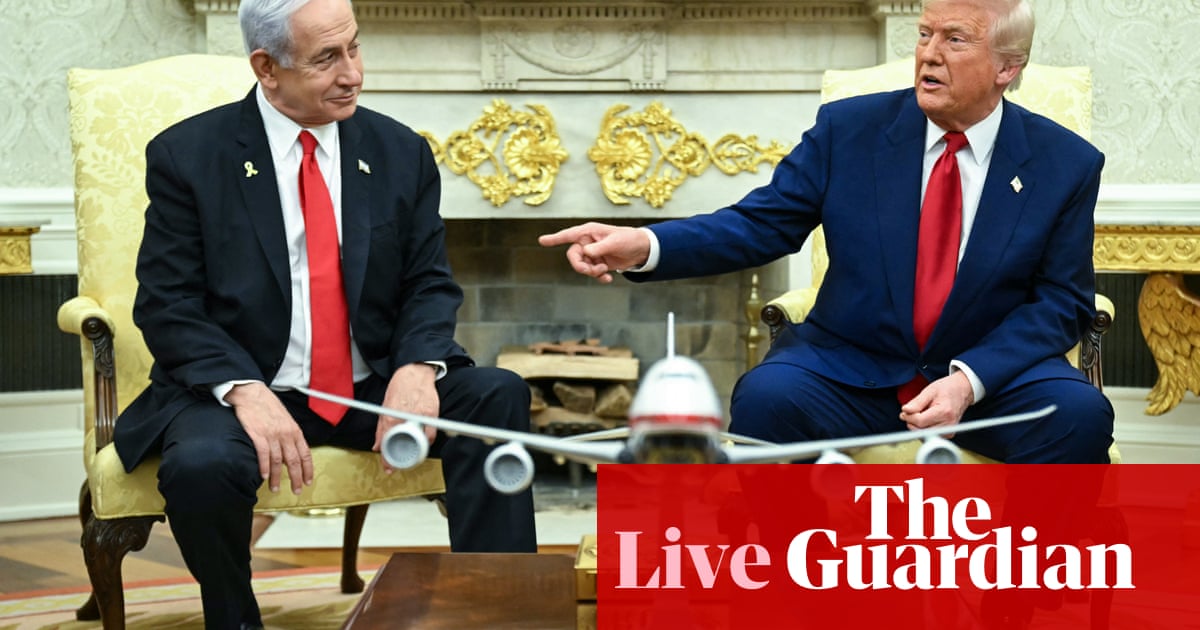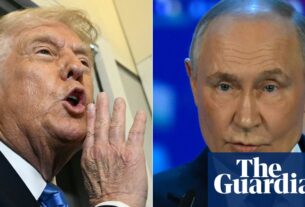Trump says US and Iran to hold direct talks on nuclear program on Saturday
Donald Trump says the US and Iran are participating in direct talks over the Iranian nuclear program, a surprise announcement after Iranian officials had appeared to rebuff US calls for such negotiations.
Iran had pushed back against Trump’s demands that it directly negotiate over its nuclear program or be bombed, though it had initially left the door open to indirect discussions.
“We’re having direct talks with Iran, and they’ve started. It’ll go on Saturday. We have a very big meeting, and we’ll see what can happen,” Trump told reporters in the Oval Office during talks with visiting Israeli Prime Minister Benjamin Netanyahu.
“And I think everybody agrees that doing a deal would be preferable,” Trump said. He did not elaborate.
Key events
-
Iran will be ‘in great danger’ if US talks fail, Trump says
-
Trump repeats idea that ‘US controlling and owning Gaza Strip would be a good thing’
-
EU’s zero-zero tariffs offer ‘not happening’, Trump says
-
Tariffs could be permanent and could also be negotiated, Trump says
-
Trump says US and Iran to hold direct talks on nuclear program on Saturday
-
‘We’re not looking at pause in tariffs,’ Trump says
-
Donald Trump and Benjamin Netanyahu hold bilateral talks at White House
-
Trump administration to open tariff negotiations with Japan, says US treasury secretary Scott Bessent
-
EU offered ‘zero-for-zero’ deal to US weeks before tariff announcement
-
Trump-Netanyahu press conference canceled with no explanation given
-
Interim summary
-
EU in ‘early stages’ talks with US, but finalising list of countermeasures after steel and aluminium tariffs
-
Mexico seeks to avoid retaliatory tariffs against US, but not ruling them out
-
Tariffs are a ‘colossal mistake’ and US faces long-term ruin if policies not reversed, says Richard Branson
-
Trump threatens China with additional 50% tariffs effective from Wednesday if it doesn’t withdraw its retaliatory levies
-
White House dismisses report of Trump considering a 90-day pause in tariffs as “fake news.”
-
‘Nobody is pretending tariffs are good news’: UK’s Starmer vows to cut trade barriers with key partners in response to tariffs
-
Wall Street slides, putting S&P 500 into ‘bear market’ territory
-
Trump adviser Navarro dismisses Elon Musk as ‘car assembler’ after ‘zero tariff’ comments
-
Japan PM Shigeru Ishiba says he told Trump to rethink tariff policies
-
Canada initiates WTO dispute over US 25% tariff on cars
-
Billionaire Trump backer warns of ‘self-induced economic nuclear winter’ as he urges president to pause tariffs
-
‘Aggressive and arbitrary’ US tariffs need united EU response, says French minister as EU discusses next move
-
Netanyahu arrives in Washington as first foreign leader to try to negotiate better deal after Trump’s shock tariff announcement
-
Trump says Fed should cut rates
-
China accuses US of economic bullying
-
Trump compares tariffs to ‘medicine’ as markets point to rough week ahead
Iran will be ‘in great danger’ if US talks fail, Trump says
Trump says Iran would be in “great danger” if ongoing direct talks fail.
“I think if the talks aren’t successful with Iran, I think Iran’s going to be in great danger,” Trump says. “Iran cannot have a nuclear weapon and if the talks aren’t successful I actually think it will be a very bad day for Iran.”
Trump repeats idea that ‘US controlling and owning Gaza Strip would be a good thing’
Trump refers once again to the Gaza Strip as “an incredible piece of important real estate”.
He says that the United States’ “controlling and owning” the Gaza Strip would be a good thing, again floating a shocking proposal that he put forward multiple times during the opening weeks of his administration (incidentally, it was during Netanyahu’s last visit).
“Having a force like the United States there, controlling and owning the Gaza Strip would be a good thing,” he doubles down.
He then claims Palestinians don’t want to live in Gaza, so moving them to different countries would be a good thing.
He once again calls the strip “oceanfront property”.
Trump also claims that the EU “manipulates its currency”, bringing it down to make it hard for the US to sell products there. He is also very concerned about tractors.
Trumps says his qualms with trading with the EU is not just about tariffs.
“It’s not only tariffs, it’s non-monetary tariffs. It’s tariffs where they put things on that make it impossible for you to sell a car. It’s not a money thing. They make it so difficult – the standards and the tests,” he says, before going off into a bizarre bowling ball analogy.
“So they come up with rules and regulations that are just designed for one reason: that you can’t sell your product in those countries and we’re not going to let that happen. Those are called non-monetary barriers,” he says.
Trump says selling energy to the EU would be a key focus as his administration seeks to eliminate a trade deficit with the bloc.
“The European Union’s been very bad to us,” Trump says, accusing European nations of not buying enough US goods.
“They’re going to have to buy their energy from us, because they need it and they’re going to have to buy it from us. They can buy it, we can knock off $350bn in one week,” he claims.
EU’s zero-zero tariffs offer ‘not happening’, Trump says
Trump says the EU’s offer zero-zero tariffs on cars and industrial goods isn’t happening.
Trump says the US is having “high-level” and “direct” talks with Iran.
“Maybe a deal’s going to be made, that would be great. It would be really great for Iran,” he says.
They’re meeting on Saturday at “almost the highest level”, he says.
Tariffs could be permanent and could also be negotiated, Trump says
Asked if the tariffs are permanent or open to negotiations, Trump says: “They can both be true, there can be permanent tariffs and there can be negotiations.”
There are things we need beyond tariffs, like open borders, says Trump.
“China is a closed country,” he claims, charging tariffs so high on things like cars that nobody buys them.
“We’ll be talking to China,” Trump says, along with other countries.
Trump says US and Iran to hold direct talks on nuclear program on Saturday
Donald Trump says the US and Iran are participating in direct talks over the Iranian nuclear program, a surprise announcement after Iranian officials had appeared to rebuff US calls for such negotiations.
Iran had pushed back against Trump’s demands that it directly negotiate over its nuclear program or be bombed, though it had initially left the door open to indirect discussions.
“We’re having direct talks with Iran, and they’ve started. It’ll go on Saturday. We have a very big meeting, and we’ll see what can happen,” Trump told reporters in the Oval Office during talks with visiting Israeli Prime Minister Benjamin Netanyahu.
“And I think everybody agrees that doing a deal would be preferable,” Trump said. He did not elaborate.
On his “very good” conversation with Japanese prime minister Shigeru Ishiba this morning, Trump confirms “they’re coming.” “I told them you’re going to have to open up their country.”
He claims the US “sold zero cars” in Japan while they sold “millions” to the US and only take “a little bit” of US agriculture.
‘We’re not looking at pause in tariffs,’ Trump says
Asked if he would be open to a pause in tariffs to allow for negotiations, Trump says: “We’re not looking at that.”
He says there are many countries coming to negotiate deals with the US. These will be fair deals, he says. In some cases they’ll be paying substantial tariffs, he adds.
He reiterates his threat to add another 50% tariff on Chinese imports unless that country withdraws its threat to add a [retaliatory] 34% tariff on its goods.
Trump says he and Netanyahu had a “great discussion” on Iran and trade.
Donald Trump and Benjamin Netanyahu hold bilateral talks at White House
Donald Trump and Israeli PM Benjamin Netanyahu are speaking from the Oval Office now. I’ll bring you all the main lines.
Trump administration to open tariff negotiations with Japan, says US treasury secretary Scott Bessent
US treasury secretary Scott Bessent said Donald Trump has tasked him with opening negotiations with the Japanese government in response to tariffs imposed by the US president.
It follows the phone call that took place earlier today between Trump and Japanese prime minister Shigeru Ishiba, in which Ishiba told Trump that his tariff policies are extremely disappointing and urged him to rethink. Ishiba also said he agreed with Trump to continue constructive dialogue on the issue.
In a post on Twitter/X, Bessent said the call was “very constructive” and Trump had tasked “me and @USTradeRep to open negotiations to implement the President’s vision for the new Golden Age of Global Trade with @JPN_PMO Shigeru Ishiba and his Cabinet”.
Trump’s decision to impose a 25% levy on auto imports, and a “reciprocal” 24% tariff on other Japanese goods, is expected to deal a huge blow to Japan’s export-heavy economy with analysts predicting the higher duties could knock up to 0.8% off economic growth. The call took place after Asian markets slumped dramatically on Monday, with Japan’s benchmark Nikkei stock index plummeting by nearly 9%.
Japan has so far taken a measured approach with Ishiba signaling earlier in the day that Tokyo would not seek direct confrontation with Washington over the tariffs.
After the phone call Trump said Japan was sending a “top team to negotiate” on trade.
Continuing his announcement post on X, Bessent said:
Japan remains among America’s closest allies, and I look forward to our upcoming productive engagement regarding tariffs, non-tariff trade barriers, currency issues, and government subsidies. I appreciate the Japanese government’s outreach and measured approach to this process.
Bessent goes on to contrast Japan’s “measured” approach with that of China’s “retaliation”. (If Trump goes ahead with the increases announced today then China, unlike Japan, is potentially facing a 104% tariff on goods imported by the US, lest we forget). Bessent said:
China has chosen to isolate itself by retaliating and doubling down on previous negative behavior. Over 50 countries have responded both openly and positively to @POTUS @realDonaldTrump’s historic action to create a fairer, more prosperous system of global trade. We look forward to meaningful negotiations with them over the coming weeks.
The US Conference of Catholic Bishops is ending a half-century of partnerships with the federal government to serve refugees and children, saying the “heartbreaking” decision follows the Trump administration’s abrupt halt to funding for refugee resettlement.
The Associated Press reports that the bishops said the break will inevitably result in fewer services than what Catholic agencies were able to offer in the past to the needy.
“As a national effort, we simply cannot sustain the work on our own at current levels or in current form,” said Archbishop Timothy Broglio, president of the USCCB. “We will work to identify alternative means of support for the people the federal government has already admitted to these programs. We ask your prayers for the many staff and refugees impacted.”
The decision means the bishops won’t be renewing existing agreements with the federal government, the bishops said. The announcement did not say how long current agreements were scheduled to last.
Catholic bishops sued the Trump administration in February over its abrupt halt to the funding of aid provided to newly arrived refugees, saying they are owed millions already allocated by Congress to carry out resettlement aid under agreement with the federal government.
But a federal judge ruled that he couldn’t order the government to pay money due on a contract, saying a contractual dispute belongs before the court of federal claims. The bishops have appealed that ruling.
The announcement did not specify whether the cuts would lead to any layoffs, though Broglio asked for prayers for the “many staff and refugees impacted”.
US Navy vice-admiral Shoshana Chatfield, who holds a senior position in Nato, has been fired as part of what appears to be an expanding national security purge of top officials by the Trump administration, three sources told Reuters on Monday.
The information was not immediately confirmed by the Pentagon. However, the sources told Reuters that allies had been notified that Chatfield had been removed from her job.
Chatfield, the US military representative to the Nato’s military committee, is one of only a handful of female Navy three-star officers and was the first woman to lead the Naval War College, a job she held until 2023.
The firing is the latest to rock the Pentagon after Thursday’s removal of Gen Timothy Haugh, the head of the National Security Agency and US Cyber Command. For the Navy, it follows the firing of its top officer, Adm Lisa Franchetti, the first woman to become chief of naval operations.
It was unclear if any official reason was given for Chatfield’s dismissal, or if it was related to any US policy direction on Nato. One source said the motive may have been related to the Pentagon’s crackdown on diversity, equity and inclusion initiatives.
The Pentagon did not immediately respond to a Reuters request for comment.
This is from Hillary Clinton.



